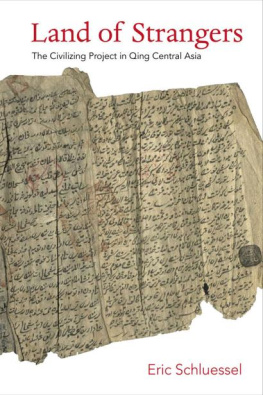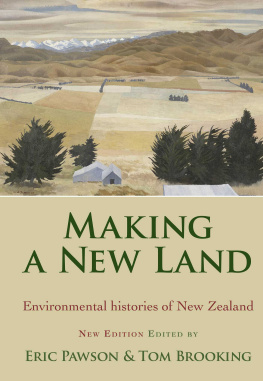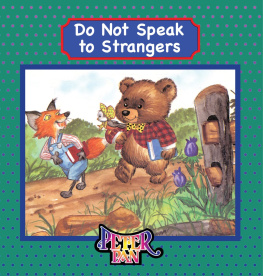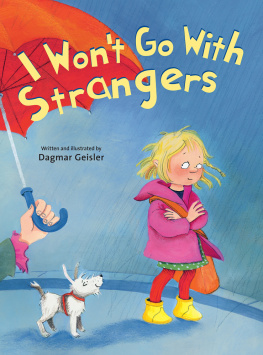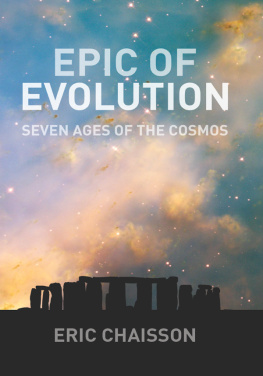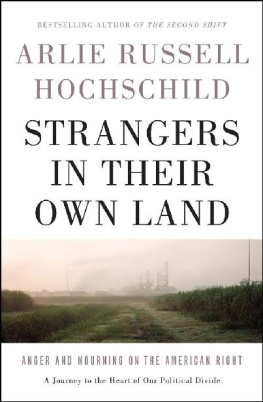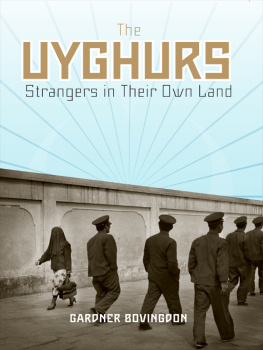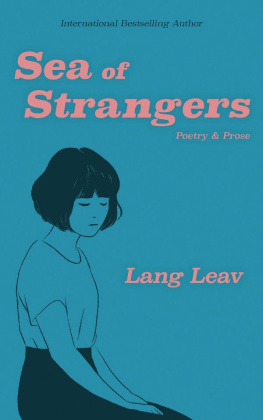Eric Schluessel - Land of Strangers
Here you can read online Eric Schluessel - Land of Strangers full text of the book (entire story) in english for free. Download pdf and epub, get meaning, cover and reviews about this ebook. year: 2020, publisher: Columbia University Press, genre: Art. Description of the work, (preface) as well as reviews are available. Best literature library LitArk.com created for fans of good reading and offers a wide selection of genres:
Romance novel
Science fiction
Adventure
Detective
Science
History
Home and family
Prose
Art
Politics
Computer
Non-fiction
Religion
Business
Children
Humor
Choose a favorite category and find really read worthwhile books. Enjoy immersion in the world of imagination, feel the emotions of the characters or learn something new for yourself, make an fascinating discovery.
- Book:Land of Strangers
- Author:
- Publisher:Columbia University Press
- Genre:
- Year:2020
- Rating:4 / 5
- Favourites:Add to favourites
- Your mark:
- 80
- 1
- 2
- 3
- 4
- 5
Land of Strangers: summary, description and annotation
We offer to read an annotation, description, summary or preface (depends on what the author of the book "Land of Strangers" wrote himself). If you haven't found the necessary information about the book — write in the comments, we will try to find it.
Land of Strangers — read online for free the complete book (whole text) full work
Below is the text of the book, divided by pages. System saving the place of the last page read, allows you to conveniently read the book "Land of Strangers" online for free, without having to search again every time where you left off. Put a bookmark, and you can go to the page where you finished reading at any time.
Font size:
Interval:
Bookmark:
Land of Strangers
LAND
OF
STRANGERS
The Civilizing Project in Qing Central Asia
ERIC SCHLUESSEL

COLUMBIA UNIVERSITY PRESS NEW YORK
Columbia University Press
Publishers Since 1893
New York Chichester, West Sussex
cup.columbia.edu
Copyright 2020 Columbia University Press
All rights reserved
E-ISBN 978-0-231-55222-6
Library of Congress Cataloging-in-Publication Data
Names: Schluessel, Eric, author.
Title: Land of strangers : the civilizing project in Qing Central Asia / Eric Schluessel.
Description: New York : Columbia University Press, 2020. | Includes bibliographical references and index.
Identifiers: LCCN 2020010173 (print) | LCCN 2020010174 (ebook) | ISBN 9780231197540 (hardcover) | ISBN 9780231197557 (paperback)
Subjects: LCSH: Xinjiang Uygur Zizhiqu (China)History. | Xinjiang Uygur Zizhiqu (China)Ethnic relations. | Xinjiang Uygur Zizhiqu (China)Politics and government. | Uighur (Turkic people)History. | ChinaColoniesChinaXinjiang Uygur Zizhiqu. | Asia, CentralRelationsChina. | ChinaRelationsAsia, Central. | ChinaHistoryQing dynasty, 16441912.
Classification: LCC DS793.S62 .S35 2020 (print) | LCC DS793.S62 (ebook) | DDC 951/.6035dc23
LC record available at https://lccn.loc.gov/2020010173
LC ebook record available at https://lccn.loc.gov/2020010174
A Columbia University Press E-book.
CUP would be pleased to hear about your reading experience with this e-book at .
Cover design: Milenda Nan Ok Lee
Cover image: Bilingual Chaghatay-Chinese document, dated 1928. Photo by author.
To Gwendolyn, who revels in the marginalia
To my colleagues who have disappeared, or are imprisoned, or silenced: I wish that I could name you here and celebrate your scholarship. I hope that someday you will read this book, and that, when you do, it pleases you. You nurtured meyou were patient when I was headstrong, subtle when I was brash. You taught me diligence, dedication, and commitment to historical and scientific truth. Thank you for welcoming me in.
Thank you to Gwendolyn Collao, without whom none of this is worth it. You push me to be betteras a scholar and as a personand to seek out moments of joy. Thank you for your perspicacious eye and quick mind, and for insisting that I take breaks.
This book is the product of many years of other peoples kindness. Members of the original dissertation committee tolerated the mounds of paper that I occasionally wadded up and lobbed haphazardly in their directions. Thank you to Mark Elliott for taking me on as a student, pushing me to consider the position and impact of scholarly work, and insisting on philological rigor. You were there for me during some of the hardest times in this process, and I will never forget it. Thank you to Michael Szonyi, who showed me how to build an argument that might withstand his vigorous questioning, fielded endless queries about puzzling through local archives, and modeled a joyful and humane professionalism. Ildik Bellr-Hann was present in this work from its very conception. Her insightful methodological and empirical critiques enriched the argument greatly, ensuring that it remained grounded in ethnography and textual scholarship while engaging wisely with theory. William Alford, who is a profoundly benevolent individual, saw the value in this works underlying project and encouraged me to pursue a more disciplined comparison. From the age before Harvard, the humid days of Indiana, I must thank Gardner Bovingdon, who taught me Xinjiang history and politics but, just as importantly, let me play in the great sandbox of social theory. Much of this book is a working-out of questions that I began to ask because of Gardner. Devin DeWeese not only taught me Chaghatay and all sorts of things about Naqshbands but was kind enough to read a draft of all of fourteen years after I first walked into his classroom. It has been a great pleasure to reconnect with Christopher Atwood, who understands what kind of book this is. Many other established scholars have given their time and effort to support my mad caper, among them Pr Cassel, Cemal Kafadar, Ablet Kamalov, James Millward, Carla Nappi, Ahmed Ragab, David J. Roxburgh, Birgit Schlyter, Jun Sugawara, Donald Sutton, Onuma Takahiro, and Qiu Yuanyuan. Yet special thanks surely go to Wheeler Thackston, on whose sofa I learned not only to puzzle through a text in Chaghatay, but to grasp it. I hope sincerely to pay their generosity forward.
There is no creativity without a community, and I am fortunate to be part of a generous one. So many hours of intellectual ferment were spent in the company of other true believers in this quixotic enterprise, not least among them Gregory Afinogenov, Katherine Alexander, Elise Anderson, Sarah Bramao-Ramos, David Brophy, Darren Byler, Belle Cheves, Sakura Christmas, Brian Cwiek, Maura Dykstra, Devin Fitzgerald, Joshua Freeman, Billy French, Kelly Hammond, Justin Jacobs, Macabe Keliher, Nicholas Kontovas, Ben Levey, Eve McGlynn, Aysima Mirsultan, Anne-Sophie Pratte, David Porter, Max Oidtmann, Guldana Salimjan, Rune Steenberg, David Stroup, Hannah Theaker, Rian Thum, Wei-chieh Tsai, Noriko Unno, Nicholas Walmsley, and Xin Wen. Special thanks to Mira Xenia Schwerda, who volunteered to read this shambles of a book the weekend before it was due. Many of us met under a purposefully vague rallying cryNew Directionsand the promise of snacks, or else because of our questionable decision to study Inner Asian history and culture. We seem repeatedly to demonstrate the power of community, of generosity and collegiality, to raise all of us up and help us achieve the impossiblewhich is precisely how some originally characterized the concept of this book. Thank you for reading the drafty chapters that emerged over the years, but thank you also, as times have grown darker, for standing up for what you know to be right. That is the kind of scholarly community I want to be part of.
Friends and colleagues at the University of Montana in the Departments of History and Political Science and beyond lent time and patience to this project. Thank you especially to Claire Arcenas, Abhishek Chatterjee, Brad Clough, John Eglin, Robert Greene, Tobin Miller-Shearer, and Jody Pavilack for understanding. Thank you to the core members of the Montana East Asia Workshop, or MEAW: Brian Dowdle, Maggie Greene, and Rob Tuck. I am glad that we value one another as scholars and as human beings. Time spent with youover Robs unfairly good cooking, Brians backyard dinners, or fleeing into the mountains to meet Maggie halfwayhas meant the world to me. Much of the thinking behind this book played out in conversation with my students at Montana as we tracked patterns of change across the broad sweep of Chinese history, talked through Neo-Confucian philosophy, or critiqued theories of nationalism. If you read this, please understand that it is a singular privilege to know you and work with you. Take a moment to look east along the Clark Fork River, into the space between the mountains, and consider the mystery.
The final draft of this book was completed during research leave under a Mellon Fellowship at the Institute for Advanced Study, where conversations with Nicola di Cosmo, Karl Gerth, and Lydia Liu especially influenced its composition. Research and writing have been paid for in various ways by numerous grants and fellowships: a Fellowship for Assistant Professors from the Andrew W. Mellon Foundation; research and workshop grants from the American Council of Learned Societies and Henry Luce Foundation; a Social Science Research Council International Dissertation Research Fellowship; a faculty development grant from the Department of History at the University of Montana; a Yamaguchi Fund grant from the Mansfield Center at the University of Montana; a one-month residence at the Yuelu Academy at Hunan University; traveling fellowships from Harvard University, the Weatherhead Center for International Affairs, the Fairbank Center for Chinese Studies, and the Asia Center; and a fellowship from the National Endowment for the Humanities dedicated to translating the
Font size:
Interval:
Bookmark:
Similar books «Land of Strangers»
Look at similar books to Land of Strangers. We have selected literature similar in name and meaning in the hope of providing readers with more options to find new, interesting, not yet read works.
Discussion, reviews of the book Land of Strangers and just readers' own opinions. Leave your comments, write what you think about the work, its meaning or the main characters. Specify what exactly you liked and what you didn't like, and why you think so.

